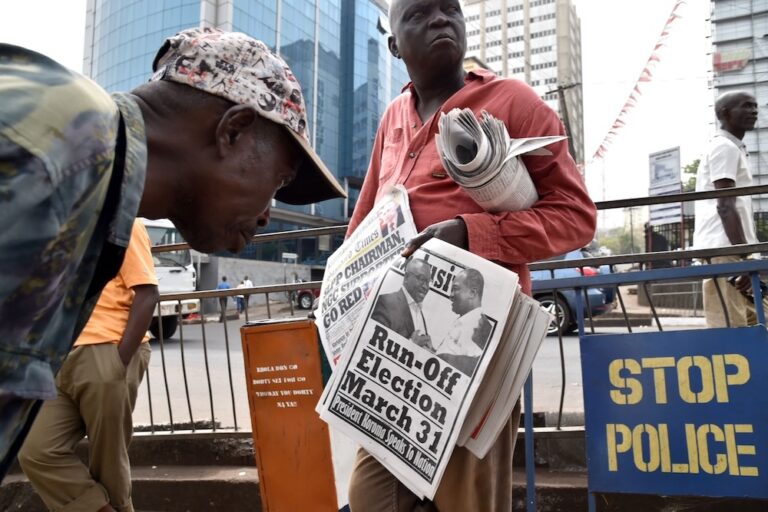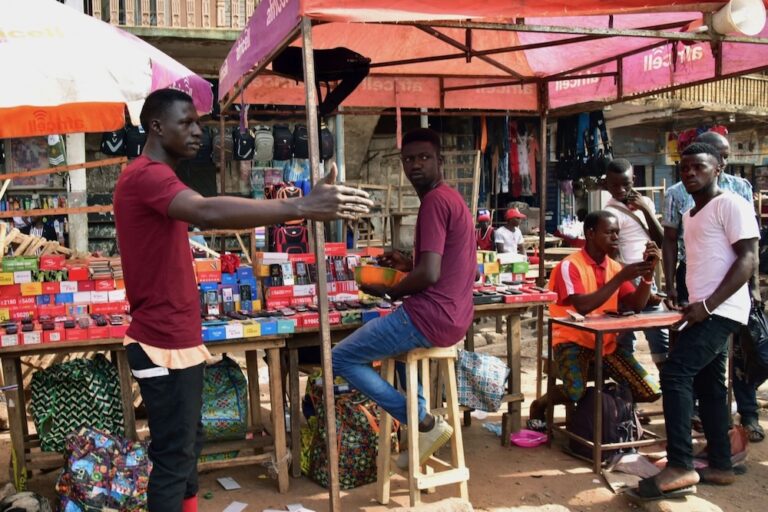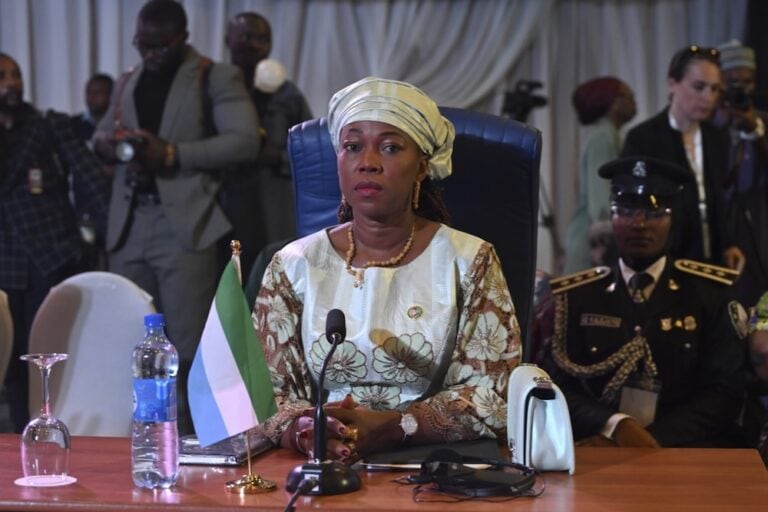(RSF/IFEX) – The following is an RSF press release: Rebels had systematic policy of elimination of journalists: **For background information, see IFEX alerts** An RSF delegation was in Guinea from 25 to 29 June 1999, where it met with 20 Sierra Leonian journalists who are seeking refuge there. The testimony provided by these journalists confirmed […]
(RSF/IFEX) – The following is an RSF press release: Rebels had systematic
policy of elimination of journalists:
**For background information, see IFEX alerts**
An RSF delegation was in Guinea from 25 to 29 June 1999, where it met with
20 Sierra Leonian journalists who are seeking refuge there. The testimony
provided by these journalists confirmed information contained in RSF’s
report “Sierra Leone: black January for the press”, which was made public in
April 1999. RSF confirmed that Sierra Leonian journalists and one American
were killed by Revolutionary United Front (RUF) rebels in January 1999 as
part of a deliberate policy aimed at the systematic elimination of
journalists from the democratic press.
Johnny Paul Koroma’s military regime, which stemmed from the coup d’Etat of
25 May 1997, had already shown its repression of independent media,
particularly media which supported the legitimacy of President Ahmad Tejan
Kabbah, who had been elected in a March 1996 vote. The military regime,
which included Armed Forces Ruling Council (AFRC) fighters and RUF rebels,
targeted journalists specifically: between 25 May 1997 and 10 March 1998,
eight journalists were imprisoned, ten were questioned and more than sixty
went underground or into exile.
When the rebels and the AFRC allies entered Freetown on 6 January 1999, they
decided to physically eliminate those journalists they accused of
criticising them and of supporting President Kabbah. Between 6 and 12
January, eight journalists were murdered: James Ogogo, Jenner Cole, Mohammed
Kamara, Paul Abu Mansaray, Alpha Amadu Bah Bah, Munir Turay and Mabay
Kamara. As soon as they arrived in Freetown, the rebels announced their
intention to kill all the journalists. Abdul Jalloh, a journalist with
“Reporter”, explained: “One of my neighbours came to warn me that the rebels
were shouting in the streets that they would attack journalists.” Several
journalists then went underground, leaving the city or even the country.
On 7 January, the rebels went to the home of Sheku Saccoh, a journalist with
the “Standard Times” and a correspondent with the British newspapers “Africa
analysis” and “New African”. The rebels found his wife, Aminata, and
interrogated her about her husband’s whereabouts. “She protected me by
refusing to tell them where I was hidden. They killed her and burned our
house”, Saccoh said. Several days after the 6 January attack on Freetown,
the rebels also ransacked the home of Sulaiman Timbo, a journalist with
“African Champion”. Timbo recalled that “They destroyed my house. They beat
me for two hours while accusing me of being a traitor journalist. They
killed my father and my younger sister. Before leaving, they set the house
on fire with the bodies still inside.” Junior Michael, a journalist with the
“Independent Observer” who was captured by a group of rebel soldiers in
Freetown, has not forgotten his attackers: “They hit me and tied me to a
tree. They killed my brother and left me tied to the tree for two days, in
front of my brother’s body.” Michael E. Kamara, publication editor of
“Pathfinder” was arrested by a group of rebels while he was trying to leave
the downtown area. “They recognized me and accused me of not having
supported them. A young rebel soldier burned my hands,” Kamara said.
Some journalists who have been brutally victimized have been profoundly
traumatized by what they saw and lived through. Ibrahim Sankoh, a cameraman
with SLBS, the national television station, has been unable to speak since
January. Sankoh can only communicate by writing: “They arrived at my house
and beat me like crazy. I was on the floor, paralysed, and they hit members
of my family. Happily, a soldier who knew me arrived and he saved me.”
Often the journalists who had earlier been persecuted under the junta were
the first to be targeted in the January attack. Mohamed Fajah Barrie, a
journalist with the “Concord Times”, stated that “the junta never stopped
attacking us, the rebels never stopped threatening us while they were in the
forest. As soon as they arrived in Freetown, they looked for us to kill us.”
On 6 January, a group of rebels questioned Barrie on the street. The rebels
did not recognize him but killed his younger brother in front of him.
Several days later, another group came to Barrie’s home, but when he escaped
with another journalist, Alpha Amadu Bah Bah, the rebels opened fire. Barrie
explained that “the soldier shot at my colleague, hitting him. They aimed at
me, but I jumped over a wall and ran.”
Dorothy Awoonor Gordon had been arrested in 1997 at her home by AFRC
soldiers. She was accused of having written critical articles which were
published in the “Concord Times”. “They beat me and held me for seven days
in a damp cell where I slept on the floor”, she stated. Released with the
help of the Association of Sierra Leonian Journalists (SLAJ), Awoonor Gordon
was unjustly accused by Kabbah government authorities of having collaborated
with the junta. Rebels arrived at her home on 6 January: “All the members of
my family were evicted from our house. They asked them where I was hiding.
They set the house on fire while I was hidden under my bed. I managed to
escape through the garden while my sisters, who were trying to help me, were
beaten by the rebels.”
According to several witnesses, the rebels arrived in Freetown with lists of
journalists considered to be pro-government. Marvin James, the “Guardian”‘s
editorial director, was arrested by rebels on 6 January. “They caught me,
beat me, and stole 500,000 leones (US$531/520Euros) which I had just
received from the newspaper’s advertisers. They had a list of journalists
and they threatened to kill me if I didn’t give them the names and addresses
of my colleagues.” James was able to escape, but his wife was tortured by
AFRC soldiers, receiving electric shocks to her legs. She was finally able
to escape with the help of a soldier. James is worried that his son has been
killed by the same soldiers.
RSF’s April report presented recommendations to Sierra Leonian and
international authorities. RSF is today reiterating its demand that the
Sierra Leonian justice system open an inquiry into all the cases of
journalists murdered by rebels and by ECOMOG forces (West African peace
keeping force). On 2 February 1999, ECOMOG assassinated Abdul Juma Jalloh, a
journalist with “African Champion” (those responsible have still not been
identified or punished). RSF is also asking international authorities and
western governments to make special funds available to aid the private and
public press, essential actors in instituting peace. They are equally asking
that exceptional measures are provided to help, both materially and
psychologically, Sierra Leonian journalists living as refugees.


